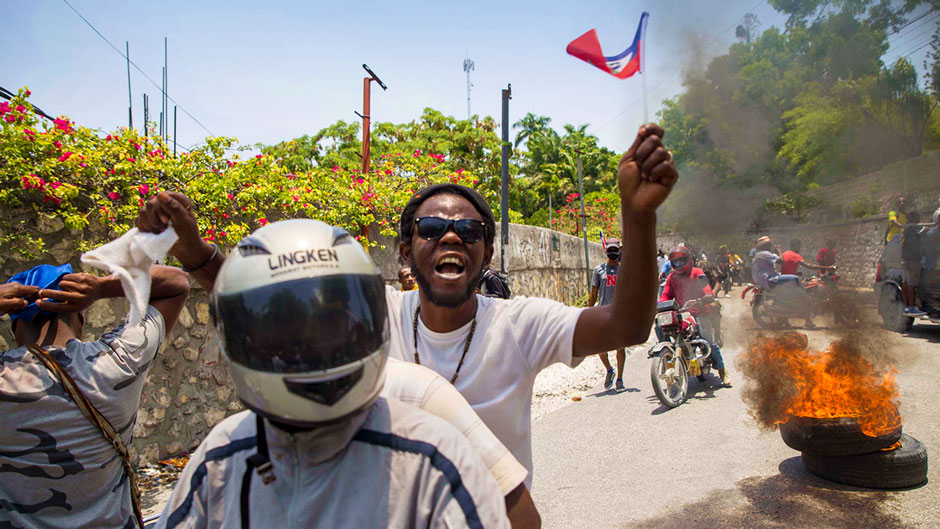Haiti, once again, is in a state of crisis.
The poorest country in the Western Hemisphere, Haiti has been battered by political upheavals, natural disasters, corruption, and disease epidemics throughout its history. But this latest crisis may be one of the most dire.
President Jovenel Moïse, a businessman who was elected in 2017 in a disputed election, has dissolved parliament, dismantled key institutions responsible for government oversight, and has been ruling by decree since 2018.
Further exacerbating the current political crisis is the June 27 referendum put forth by the president to adopt a new constitution for the country. The vote on the referendum has been postponed because of the coronavirus epidemic. No new date has been announced.
Moïse also contends that his presidential term ends in 2022, while opposition members claim that his term ended in February 2021.
For the past several months, thousands of Haitians have marched in protest calling for the president to step down—citing corruption and accusing him of colluding with gangs in order to suppress the opposition and maintain power.
The open alliance between the government and local gangs in the capital of Port-au-Prince has led to open turf wars, resulting in increased violence and kidnappings.
According to Louis Herns Marcelin, professor of anthropology at the College of Arts and Sciences, these gangs are subsidized by powerful people in Haiti, including members of the government and some members of the private sector.
“But there are not enough funds for every gang,” said Marcelin, who is also director of Global Health Studies and was born in Haiti. “When one gang gets money, the others make counter demands for their share.”
This practice has emboldened gang members. Last weekend, six local police precincts in Port-Au-Prince were ransacked and guns and ammunition stolen. Several police officers lost their lives, one of them was burnt alive by gang members.
“This kind of situation creates a de facto dictatorship,” said Marcelin. “[Moïse] is seen as an illegitimate president, and many are asking for him to step down.”
Marcelin pointed out that the current crisis was initially sparked by the misappropriation of $3.8 billion granted by the PetroCaribe Energy Agreement, a partnership with Venezuela that gave the island nation fuel at a discount as well as subsidies to help build its infrastructure.
“Money from PetroCaribe was siphoned off by political elites who benefitted from it, including Moïse,” said Marcelin. “People have been holding demonstrations and asking for this money to be returned since the country needs it.”
All of this is playing out amid of a surge in COVID-19 infections in the country, Marcelin noted. Haiti, which had escaped the worst ravages of the virus initially, showed on Tuesday 16,662 cases and 358 deaths, according to the Worldometer, a website that provides real-time statistics.
Haiti does not have COVID-19 vaccines available, according to news reports. “The few hospitals we do have are overwhelmed,” said Marcelin.
The political unrest and violence in the Haitian capital has spread to the country’s provinces, affecting Marcelin personally. He runs the Interuniversity Institute for Research and Development, a transdisciplinary research institute with the mission to contribute to the development of high-level research and scientific training in Haiti and the Caribbean. The institute currently has several studies and interventions underway with field teams throughout the country. Marcelin has been faced with safely evacuating researchers from provinces south and north of the capital.
Helping Haiti out of this crisis will not be easy, according to Marcelin.
In the past neither the United Nations, U.S. Agency for International Development, or any other foreign organizations that have tried to help the island nation have been successful, he said, in part because they have not acknowledged and involved the many grassroots organizations that are working throughout the country.
The United States has insisted that the president of Haiti set elections as quickly as possible. Marcelin noted that Moïse has lost the respect of the people and what the country needs is a “transitional government” that can organize fair and free elections.
“We do not want an invasion of Haiti,” he said. “But we do need an organizing platform that can convene key institutions and vital sectors of the country, community-based organizations, cooperatives, and civic groups to develop the path for a future government.”

